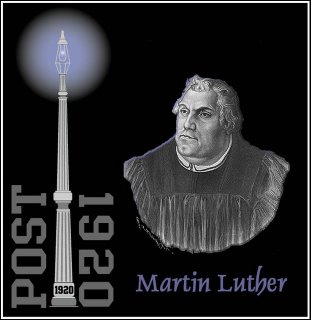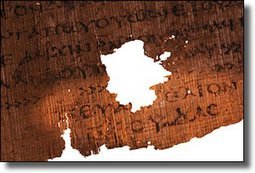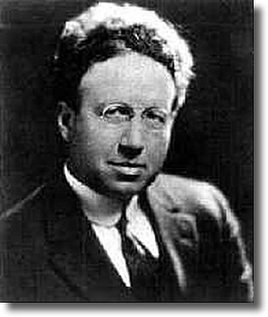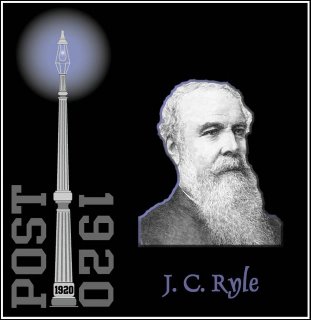 Some of the recent discussions about the Gospel, especially as it is communicated through John chapter 3, have led some to conclude that it is not at all worth the time or effort. Perhaps this is true in some cases – especially with discussions that that don’t track well with the Scriptures, however, when we consider the importance of the Gospel itself we should not be so quick to cast aspersions on the debate. For many years, the Gospel message has been kicked around like a ball in a bad competition between extreme viewpoints, and John chapter 3 has often been one of the major playing fields in such contests. Amidst the realm of modern “Evangelicalism” the issue too often becomes reduced to a binary debate about whether God loves sinful men (John 3:16) or whether His wrath burns against them (John 3:18, 36).
Some of the recent discussions about the Gospel, especially as it is communicated through John chapter 3, have led some to conclude that it is not at all worth the time or effort. Perhaps this is true in some cases – especially with discussions that that don’t track well with the Scriptures, however, when we consider the importance of the Gospel itself we should not be so quick to cast aspersions on the debate. For many years, the Gospel message has been kicked around like a ball in a bad competition between extreme viewpoints, and John chapter 3 has often been one of the major playing fields in such contests. Amidst the realm of modern “Evangelicalism” the issue too often becomes reduced to a binary debate about whether God loves sinful men (John 3:16) or whether His wrath burns against them (John 3:18, 36).
The problem with this form of argumentation is that it establishes a false dichotomy.
A careful study of John 3 will remind us that it is not for us to pick and choose one reality over the other. What typically happens in various theological camps is that some will adopt an all-or-nothing approach, rather than accepting the biblical fact that the truths of God’s love, and His wrath, exist together in perfect harmony. Our greatest problem is found, not in the doctrines themselves (God’s word is non-contradictory), but in the frailty of our own human understanding; after all, the character of God is so far beyond our grasp that we must at some point recognize that such concepts are beyond the pale of human reason:
Romans 11:33-35: 33 Oh, the depth of the riches both of the wisdom and knowledge of God! How unsearchable are His judgments and unfathomable His ways! 34 For who has known the mind of the Lord, or who became His counselor? 35 Or who has first given to Him that it might be paid back to him again? 36 For from Him and through Him and to Him are all things. To Him be the glory forever. Amen.
God’s wrath against, and His love for the unbeliever is in many ways – unsearchable and unfathomable; but that doesn’t mean that we are not to accept it in faith. With respect to John chapter 3, it is most popular in the modern church to try to emphasize God’s love to the exclusion of His justice and wrath; but on the other hand, this problem is never remedied by minimizing the vast nature of God’s love; and especially with respect to John 3, such a de-emphasis is a textual impossibility:
John 3:16a “gar hegepesen ho theos ton kosmon…”
Mark this: the emphatic position of the verb in verse 16 [hegepesen] should be translated [or at least should be understood] as: “LOVED! God the world…” Though this reading might seem odd, it is the way in which the sentence is constructed for the sake of emphasis (Most translations employ the word so [so loved] in order to convey this emphatic idea). This emphatic expression is crucial. If we were to relegate God’s love for the world to some minor thought or point – then we have failed to herald what Christ Himself emphasized – and that’s not a good idea (that’s what’s called an understatement by the way). But on the other hand, it must be recognized that this message of God’s love ultimately loses its depth and profundity should we minimize or even remove the reality of man’s impending doom (v. 16 to perish), the judgment he deserves (v. 18) and the condemnation that he will face should he not believe in Christ (v. 36) – and that too is not a good idea. You see, the glistening gem of God’s love is most wonderfully magnified against the dark reality of man’s sin and deserved condemnation. Therefore, should we fail to present John 3 in the fullness of its glorious context, then we run the risk of corrupting the truth in some way.
The Gospel is not a buffet line where we can simply put on our platter only those things that we prefer. Our only real option is to serve up the full measure of God’s Word – and do our best to get out of the way in the process. The simultaneous realities of God’s love and holy wrath are often a stumbling block for the human mind, but even though it is a confounding thought, it is nonetheless true – the Lord loves and even hates His enemies:
Romans 9:6-13: 6 But it is not as though the word of God has failed. For they are not all Israel who are descended from Israel; 7 neither are they all children because they are Abraham’s descendants, but: “through Isaac your descendants will be named.” 8 That is, it is not the children of the flesh who are children of God, but the children of the promise are regarded as descendants. 9 For this is a word of promise: “At this time I will come, and Sarah shall have a son.” 10 And not only this, but there was Rebekah also, when she had conceived twins by one man, our father Isaac; 11 for though the twins were not yet born, and had not done anything good or bad, in order that God’s purpose according to His choice might stand, not because of works, but because of Him who calls, 12 it was said to her, “The older will serve the younger.” 13 Just as it is written, “Jacob I loved, but Esau I hated.”
The Lord hated Esau? Yes, that’s what it says. God’s hatred of sin and evil is a doctrine that is often hidden with shame in the contemporary church; and yet, we must be careful not to stress this truth beyond the balance of the full counsel of Scripture. I say this because there are some who will take this text and emphasize it to such a level that they forsake the truth of God’s compassionate love for this world of rebellious sinners:
Matthew 5:43-45: 43 You have heard that it was said, “You shall love your neighbor, and hate your enemy.” 44 But I say to you, love your enemies, and pray for those who persecute you 45 in order that you may be sons of your Father who is in heaven; for He causes His sun to rise on the evil and the good, and sends rain on the righteous and the unrighteous.
If we were not to consult the full counsel of God’s word, then we would find ourselves with a monochromatic message of love (without justice) or justice (without love) – but neither of these offer us the Biblical option. Matthew 5:43-45 is a profound text. The children of God are to love their enemies so that they may imitate the Father’s universal love, for He causes His sun to rise on the evil and the good, and sends rain on the righteous and the unrighteous. The idea of loving one’s enemy is not the product of human logic, but it is an imitation of God’s universal love, which includes a love for those who are His enemies. God has a love for men who are evil and unrighteous – even men like Esau! In light of Matthew 5:43-45 it is amazing to consider that the Lord simultaneously hated Esau while bestowing upon him a great bounty of compassion and love; this He did upon the very one who desired his forsaken birthright, rather than the Lord Himself. God’s love for the godless may be one of the most counter-intuitive truths in Scripture, but this only shows us that human intuition is not a trustworthy resource for truth – ever. We must avoid the common error that concludes that God has no love for those who are not His own. The Lord’s love is patient, kind and full of compassion. Thus, it is by His loving patience that He has endured the many generations of sinful men (1 Peter 3:20); it was by His loving-kindness that He appeared to mankind, endowed with salvation (Titus 3:4) and offered the gracious Gospel to all men (Matthew 28:18-20); and it is by His loving compassion that He does not delight in the death of the wicked, therefore He graciously calls the wicked to repentance (Ezekiel 18:23). By His perpetual beneficence, all men have physical life and on a daily basis they behold the chorus of praise declared from all creation (Psalm 19:1-6). He showers mankind with the sun and the rain, within this habitable earth which He created for His good pleasure, and which someday will be destroyed with intense heat. Until that day, all men will continue to be the recipients of God’s universal love, without exception. And so it is: This love of God is bountifully lavished upon all men universally.
Unfortunately, the modern error is one that makes God’s love one dimensional, thus nullifying the truth that His love is distinguishable and thereby ignoring the reality of God’s unique love for His own: “Jacob I loved but Esau I hated…” God’s love for Jacob here is not the same as His expression of love for His enemies (Matthew 5:43-45). This love for Jacob is the exceptional love that God has for His own children. This is a distinction that has been all but lost in the modern era and is directly impacting the ministries of churches throughout America. But it is necessary to affirm that God’s exceptional love is given uniquely to those who are in His Son, so that they would share in His holiness. The Lord’s love for His own children is – exceptional. It is of the very same quality of unique love that the Father has for his Beloved Son, therefore, the Lord deals with His redeemed as sons.
John 15:9 Just as the Father has loved Me, I have also loved you; abide in My love.
Such love from the Father is also a love that supplies the pedagogy, chastening, reproof, and correction that is needed in order to conform His children to the image of Christ Himself. It is called exceptional here because it is uniquely given to those who are His and is withheld from those who are not:
Hebrews 12:6-8: 6 For whom the Lord loves He chastens, and scourges every son whom He receives. 7 If you endure chastening, God deals with you as with sons; for what son is there whom a father does not chasten? 8 But if you are without chastening, of which all have become partakers, then you are illegitimate and not sons.
In this important text, we have a clear distinction that is made between those who are the sons of God and those who are not. God’s love for all sinners is distinguishable – for those who are His enemies, it is a love of great mercy and compassion; for those who are in Christ, through faith in Him, it is exceptional and unique. This distinction must never be confused lest we confound the Gospel message itself.
As creatures of weakness, we are prone to go to extremes in our thinking, drifting to the left or the right of the biblical pathway. Because of this we must remember not to de-emphasize any aspect of truth in God’s Word. Thus, we must not minimize God’s universal love for all men without exception when defending the truth regarding God’s unique love for His own. As well, we must guard against a message that confounds the nature of God’s redemptive love. Yes, unbelievers are loved by God – but as His enemies (Romans 5:9-10). Because of this, the Gospel message is cohortative in nature – that is, it is a call of repentance and faith. It is a call for sinners, who are now being mercifully preserved in this life, to turn to Christ in faith so that they would be forever enveloped in the love that the Father has for His Beloved One – the Lord Jesus Christ.
Should we ever preach God’s universal love with such ambiguity that the unbeliever remains ignorant of, or satisfied with, his state of enmity – then we have failed to preach the complete message of God’s justice, mercy and holy love – all of which comprise the Gospel message of Christ and Him crucified. I can assure you that this is important: After all, we are speaking of the good news of our Savior and the very souls of men…
By God’s grace, may we never take these matters lightly!
Final note on John 3:16:
There are varying views concerning the scope of God’s love to the “world.” I hold to the view that this is an explicit and universal expression of God’s love to all men – without exception, and that God’s redemptive love is only given subordinately and implicitly in the latter portion of the verse; that is, believers (For a corollary example of God’s general and redemptive grace see 1 Peter 3:18-20 & 2 Peter 3:1-9).
Others believe that God’s love for the world, in verse 16, is to be seen as particular – for believers, from beginning to end. By itself, this is not a divisive issue among Calvinists (or at least it doesn’t have to be), nor should it be concluded that such distinctions in John 3:16 somehow become determinative concerning one’s views of God’s universal and exceptional love.




 “A Different Judas: Ancient text sheds light on disciple as Christ’s collaborator, not his betrayer” reads one newspaper headline. Yes – we could call this “new light” – Judas the collaborator. It is amazing, isn’t it, that God’s Word rarely makes the headline news; but a heretical and pseudepigraphal text, which has the substantive sophistication of a comic book (less the pictures), gets top coverage – along with a two hour special on a National Geographic cable program. This fable frenzy is just another sad illustration of what the Apostle John taught: …the whole world lies in the power of the evil one [1 John 4:19]. Like many of the “controversies” that surround the Bible today, the “Gospel” of Judas is just another overly-hyped, valueless flop, that will be heralded by a lost world which is content to feast on frivolity while forsaking the rich feast of God’s Holy Word. Despite all of the well-rehearsed talking points out there in the media, this is no controversy; instead, it is yet another moment of corruption that has been advanced by men who are at enmity with God and His Word. Frankly, if the fable frenzy were not so corrupt and foolish, it would actually be funny.
“A Different Judas: Ancient text sheds light on disciple as Christ’s collaborator, not his betrayer” reads one newspaper headline. Yes – we could call this “new light” – Judas the collaborator. It is amazing, isn’t it, that God’s Word rarely makes the headline news; but a heretical and pseudepigraphal text, which has the substantive sophistication of a comic book (less the pictures), gets top coverage – along with a two hour special on a National Geographic cable program. This fable frenzy is just another sad illustration of what the Apostle John taught: …the whole world lies in the power of the evil one [1 John 4:19]. Like many of the “controversies” that surround the Bible today, the “Gospel” of Judas is just another overly-hyped, valueless flop, that will be heralded by a lost world which is content to feast on frivolity while forsaking the rich feast of God’s Holy Word. Despite all of the well-rehearsed talking points out there in the media, this is no controversy; instead, it is yet another moment of corruption that has been advanced by men who are at enmity with God and His Word. Frankly, if the fable frenzy were not so corrupt and foolish, it would actually be funny. 1). The Gospel of Judas: A Non-Issue: What is called “The Gospel of Judas” is in fact a pseudepigraphal and gnostic text that was written sometime in the 2nd century A.D., most likely by a heretical group called the Cainites (more on the Cainites later). While scholars have known about this manuscript’s existence from the beginning, an actual copy was only recently recovered in this century. It is pseudepigraphal because it was not written by Judas, but was a contrived document that sought to vindicate the “son of perdition” as a part of the system of doctrine peculiar to the Cainite dogma. It is gnostic, in that it upholds the basic tenants of a very broad system of religion that more fully developed during the 2nd century A.D. It is important to clarify that gnosticism has nothing to do with Christianity; but people become confused over this issue, especially since many gnostics adopted some constructs of Christian doctrine that only gave it the appearence of Christianity:
1). The Gospel of Judas: A Non-Issue: What is called “The Gospel of Judas” is in fact a pseudepigraphal and gnostic text that was written sometime in the 2nd century A.D., most likely by a heretical group called the Cainites (more on the Cainites later). While scholars have known about this manuscript’s existence from the beginning, an actual copy was only recently recovered in this century. It is pseudepigraphal because it was not written by Judas, but was a contrived document that sought to vindicate the “son of perdition” as a part of the system of doctrine peculiar to the Cainite dogma. It is gnostic, in that it upholds the basic tenants of a very broad system of religion that more fully developed during the 2nd century A.D. It is important to clarify that gnosticism has nothing to do with Christianity; but people become confused over this issue, especially since many gnostics adopted some constructs of Christian doctrine that only gave it the appearence of Christianity:
 The interesting thing about the Gospel of Judas is that it was refuted as a heretical work in its own day by several early church fathers – most notably by Irenaeus, Bishop of Lyons. In his work “Against all Heresies” Irenaeus invests 31 chapters of ink and paper in refuting the heresies of his day, to include the Cainites along with their heretical, pseudepigraphal “Gospel of Judas”:
The interesting thing about the Gospel of Judas is that it was refuted as a heretical work in its own day by several early church fathers – most notably by Irenaeus, Bishop of Lyons. In his work “Against all Heresies” Irenaeus invests 31 chapters of ink and paper in refuting the heresies of his day, to include the Cainites along with their heretical, pseudepigraphal “Gospel of Judas”: 


 few texts which support such violence:
few texts which support such violence: Some men are covert about their leaven of error, while others are more open in their display of Scriptural defection. In this latter class of “theologian” we find the grandfather of modern liberalism: Harry Emerson Fosdick. I can at least respect such a man for his openness and honesty – if for nothing else. One doesn’t have to search very hard to find his denials of sound doctrine – his books are dripping with such denials. In All Nations Under God, I mention Fosdick because the seeds of his error remain with us today:
Some men are covert about their leaven of error, while others are more open in their display of Scriptural defection. In this latter class of “theologian” we find the grandfather of modern liberalism: Harry Emerson Fosdick. I can at least respect such a man for his openness and honesty – if for nothing else. One doesn’t have to search very hard to find his denials of sound doctrine – his books are dripping with such denials. In All Nations Under God, I mention Fosdick because the seeds of his error remain with us today: 




 Sadly, many of the movements found in modern “Evangelicalism” have actually weakened Gospel evangelism through a model of ministry that is eerily similar to the defections found at Laodicea. As a pastor, I am continually warned in my own heart by these things. As a friend of many brethren who are scattered abroad, I am saddened by their struggle to find a church that is committed to feeding Christ’s sheep and sending them out with the Gospel. As a child of God, I petition the Lord for renewal in our land, by the revival of His church and the spiritual awakening of the lost. Living now in the “Bible belt” I see many churches capitulating to the popular methodologies of our day. Many of these ministries have adopted a very loose concept of the church, thereby producing a breeding ground for those who are willing to believe that they need only have a positive interest in Christ in order to be a part of the “church community.” As I talk with people who are in such “ministries” they speak much about what activities they do, their baptism, their membership, their “potlucks,” their knowledge, their books or their discussion groups – but how sad it is to hear them say nothing about Christ. Unfortunately, too many of these people will someday discover that Christ demands so much more than a token partnership with the true church (Psalm 2:12), especially when He will declare to them: “I never knew you; depart from Me…” (Matt. 7:21-23). What the lost really need to understand is that they are not a part of this unique community called the church and they will never be, unless they repent of their sin and believe in the Lord Jesus Christ who laid down His life in sinner’s stead.
Sadly, many of the movements found in modern “Evangelicalism” have actually weakened Gospel evangelism through a model of ministry that is eerily similar to the defections found at Laodicea. As a pastor, I am continually warned in my own heart by these things. As a friend of many brethren who are scattered abroad, I am saddened by their struggle to find a church that is committed to feeding Christ’s sheep and sending them out with the Gospel. As a child of God, I petition the Lord for renewal in our land, by the revival of His church and the spiritual awakening of the lost. Living now in the “Bible belt” I see many churches capitulating to the popular methodologies of our day. Many of these ministries have adopted a very loose concept of the church, thereby producing a breeding ground for those who are willing to believe that they need only have a positive interest in Christ in order to be a part of the “church community.” As I talk with people who are in such “ministries” they speak much about what activities they do, their baptism, their membership, their “potlucks,” their knowledge, their books or their discussion groups – but how sad it is to hear them say nothing about Christ. Unfortunately, too many of these people will someday discover that Christ demands so much more than a token partnership with the true church (Psalm 2:12), especially when He will declare to them: “I never knew you; depart from Me…” (Matt. 7:21-23). What the lost really need to understand is that they are not a part of this unique community called the church and they will never be, unless they repent of their sin and believe in the Lord Jesus Christ who laid down His life in sinner’s stead.
 pursue the solution – emphasizing it above all else. At the heart of it all is the failure
pursue the solution – emphasizing it above all else. At the heart of it all is the failure